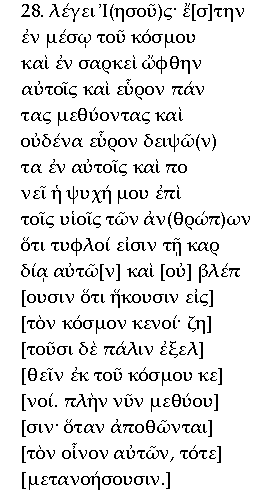Visitor Comments
A simple statement by Jesus of his mission and the response he received: I incarnated into the world and offered my message and demonstrated my true being. I found mankind to be caught in the illusion of the world as if drunk with wine. None had any thirst left for spiritual reality. This afflicted my soul. They came into the world without knowledge of their true nature and seem determined to leave it in the same state of ignorance. Only after they become weary of the illusion of reality will they seek the true Reality. Only then can someone correct them and point out the Truth.
- active-mystic
When one reaches puberty (enters into the world) one has been emptied to a greater or lesser extent by the failure of one's parents to be the parents one innately expects. So most people are spiritually blind (drunk).
- Rodney
When you are born you are an empty vessel, easily filled with the things of the world [intoxicated]. A teacher finds nearly all mankind like this. Unless a man acquires higher knowledge he will indeed be leaving the world has he entered it. You cannot take it with you is the popular saying? Wrong, there is one thing you can take with you, knowledge. You were born to acquire it, to shed your naivetivity, to gain street-credibility, to become streetwise, as the modern idiom has it
- Thief37
"All who are thirsty, come to the fountain and drink." You who thirst not, nor understand, you work iniquity and decieve yourself.
- Random
Content with the conceptual certainties we harbour, we do not seek to transcend them by spiritual insight.
- Z
|
Scholarly Quotes
Robert M. Grant and David Noel Freedman write: "In the synoptic gospels Jesus expresses appeals not unlike this one; cf., Matthew 11:25-30; 23; 37; Luke 13:34. Drunkenness is likened to ignorance of God in 1 Corinthians 15:34. In 1 Timothy 3:16 we read that 'he was manifested in flesh.' But as a whole this saying is closer to the description of the revealer given in the Hermetica, semi-Gnostic theosophical literature of the second or third century." (The Secret Sayings of Jesus, pp. 147-148)
F. F. Bruce quotes a parallel saying from the Corpus Hermeticum 1.27, attributed to Hermes the prophet of God: "I have begun to proclaim to men the beauty of piety and knowledge: 'O ye peoples, earth-born men who have given yourselves over to drunknness and sleep and ignorance of God, sober up and cease to be intoxicated and bewitched by irrational sleep.'" (Jesus and Christian Origins Outside the New Testament, p. 126)
John Dart writes: "The Jewish Wisdom of Proverbs, too, came down to the world and attempted to present truth and knowledge to a largely unmindful mankind." (The Laughing Savior, p. 96)
Stevan Davies writes: "Thomas is replete with sayings contrasting the condition of people who do and who do not apprehend the world through the primordial light of the beginning. Those who do are full; those who do not are empty (Gos. Thom. 28)." (http://www.misericordia.edu/users/davies/thomas/jblprot.htm)
Joseph A. Fitzmyer writes: "Though there is no direct parallel to this saying in the canonical Gospels there is nothing in it that prevents it from being regarded at least as substantially authentic." (Essays on the Semitic Background of the New Testament, p. 396)
Funk and Hoover write: "In this miniature discourse, Jesus speaks in highly theological terms about himself. He depicts himself as the redeemer who descends to earth and ascends to heaven, in terms very similar to those in the old hymn recorded in Phil 2:5-11 or in the prologue to the Gospel of John 1:1-5, 9-14, 16-18. However, here there are specifically gnostic twists: the spiritual state of humanity, according to numerous gnostic texts, is stupefied with passion and drunkeness, blind to any spiritual understanding. The savior comes to awaken such persons to their true origins. This complex, accordingly, is a summary version of gnostic redeemer myths that depict the human condition and the possibility for salvation." (The Five Gospels, p. 489)
R. McL. Wilson writes: "At most, it may be a development in a Gnostic direction on the basis of an authentic saying. The exposition provided by Jeremias must give pause to any who would claim it as entirely spurious. The striking feature is, however, the statement in this gospel that Jesus 'appeared in flesh,' since as Doresse observes the Coptic version elsewhere absolutely rejects the flesh. This must be held to support the theory of Puech, that the document was not originally Gnostic, although he himself has noted other possibilities, such as a Docetic interpretation of the words in question, or an orthodox revision of an originally Gnostic work." (Studies in the Gospel of Thomas, p. 42)
|

